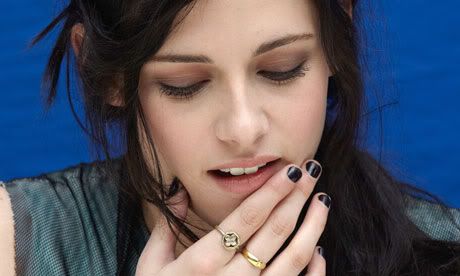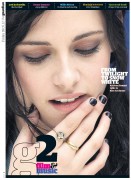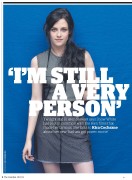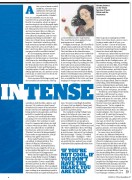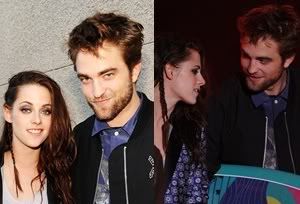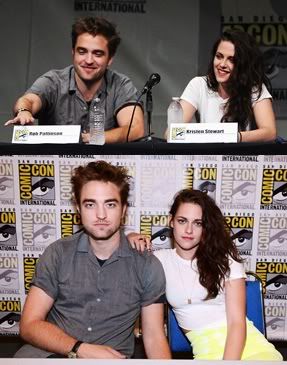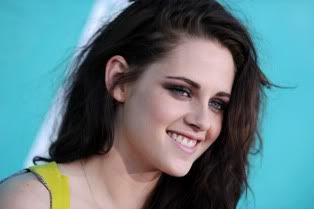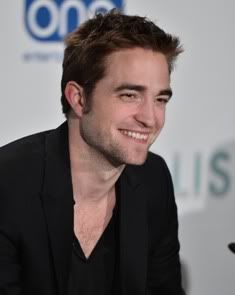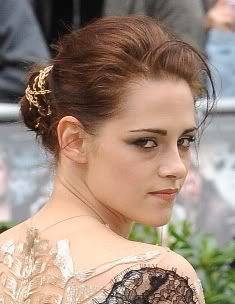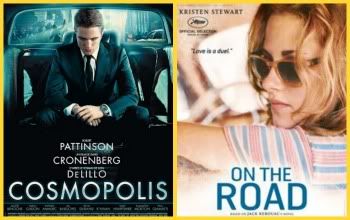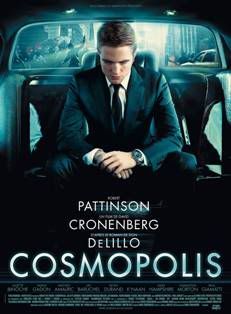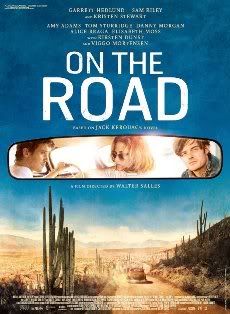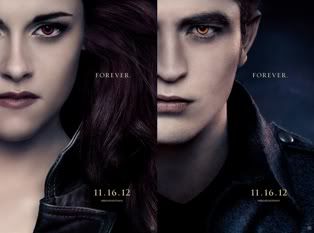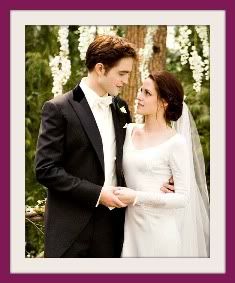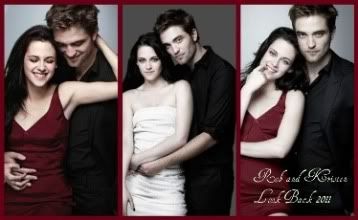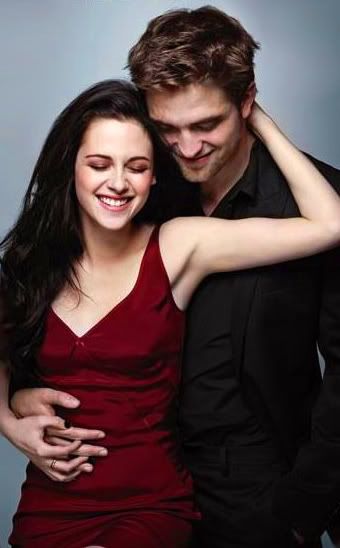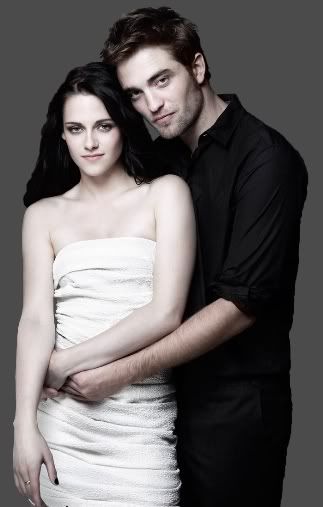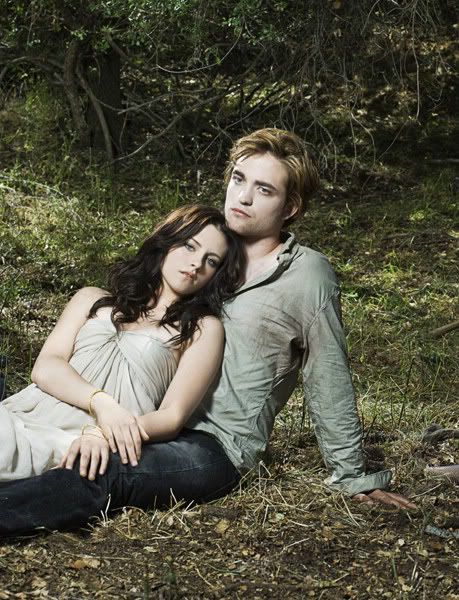Scans Lovjy @kstewartfans
TheGuardianUK After a year of unsuccessful auditions, the nine-year-old Kristen Stewart told her mother she wanted to pack it all in. It hadn't been her ambition to act; she had wanted to be an archaeologist. But she lived in Los Angeles, where an agent saw her sing in a school play aged eight, and so inevitably the notion was put to her. She was interested initially. Her parents were crew members, and she had spent time on film sets where there was a feeling that: "we were all in this together, and we were making something worthwhile". She takes one of many deep, meaningful breaths. "And then I would see a kid walk around and people would be like: 'Shhh, that's the actor, don't talk to him.' And I was like, I want a job, I want you guys to talk to me like I matter!"
It's not surprising Stewart wasn't tying down all those roles. I can't imagine her having made a convincing child star in the twinkling insincerity and too many teeth mould. She's just so socially awkward. She bounds into the hotel room, in her Led Zeppelin T-shirt and black jeans, clasping a glass of milk, and rather than sitting opposite me, she perches on the next chair, so close I have to check our knees aren't touching.
Great read - new quotes. More ahead.
She's renowned for being moody. I've read whole interviews about her dislike of being interviewed, and she certainly has nervous tics. Her leg sometimes twitches like a piston, and she says "do you know what I mean" 18 times in the course of the interview. But she seems to be putting her all into being understood as genuine, and that, in itself, is completely endearing.
Anyway, her essential traits were not going over very well in the child actor market. She would go to auditions for commercials where she had to dance with the product. She pulls a face. "And in those situations I became really like a pompous nine-year-old. I was like: 'I don't want to do those auditions any more. I feel silly.'" She asked if she could ditch the final one, and her mother said: "Kristen! You have fucking integrity! If you make an appointment, you go. I'll fire your agent tomorrow."
If she hadn't landed her role as a troubled, tomboyish kid in The Safety of Objects, followed by a role as a troubled, tomboyish kid in Panic Room, she might be off on an archaeological dig right now. Instead she's at the heart of a juggernaut.
When she first signed up, in her late teens, to play Bella Swan in Twilight, there was, she says, no talk of sequels or merchandise or monsterish profit margins. It was a small film. Stewart has been in lots of smallish films, before and since. She has played Joan Jett in The Runaways, an 80s teenager working at an amusement park in Adventureland and a girl suffering from a serious illness in The Cake Eaters. The word that is often applied to her performances is "watchful".
She started off on a distinctive route, then, an indie-inflected career, and Twilight seemed apt. The first film is all rain storms and inchoate emotion. Then the series took on a life of its own. The first film took almost $70m in its opening weekend in the US; the second, New Moon, had the biggest midnight opening in US box office history; the four films in the franchise have made more than $2bn at the worldwide box office in total. Last year, a Forbes magazine survey found that for every dollar Stewart is paid, her films bring in an average of $55.83, making her the best-value actor around - a value which reflects both the staggering speed of her rise, and how many young women adore her. Bella Swan might be devoid of any obvious interests beyond her lust for vampire Edward Cullen and werewolf Jacob Black, but her very blankness has allowed a generation of young women who are in love or would like to be to live out their longings for dangerous, unattainable men. Stewart is startlingly beautiful, of course, but her slightly clumsy gait, her palpable self-consciousness, have made her a perfect proxy.
She realised how big Twilight was going to be before it even came out, when she and Robert Pattinson, her co-star and rumoured boyfriend, were mobbed by 6,500 people at a comics convention. Did that make her nervous? "Oh my gosh. It blew my head off." She's talked since then of feeling trapped, unable to go for walks, stuck in hotel rooms. She says it's not always like that though. "I mean, if I walked out of this hotel" – Claridge's – "obviously I'd be screwed. But in London, I am perfectly fine, unless I have a trail of parasites behind me. ". The paparazzi are at the hotel entrance when I leave. "But I'm good at evading those little twits. Once I lose them, once no one's trying to make a buck off you, you know, I'm fine – I know at this point that there's a buck to be made, which is weird considering I'm just walking down the street with dirty hair."
Stewart has a silent film star face that can project all manner of wordless emotion. It's a quality that has been used to great effect in the Twilight series – all that endless staring, wanting, needing – and now in her new film, Snow White and the Huntsman, in which she stars as the titular heroine, and which threatens to become another franchise. The film is uneven. It's hard to get excited about the romantic hero, played by Chris Hemsworth, a character who spends a surprising amount of the film as a sloppy drunk. But it's visually interesting, with its blinking mushrooms, melting mirrors and dark, dark forests. Stewart and her co-star Charlize Theron, as the evil queen, are terrific.
The film is a reworking of the classic fairytale, with Stewart as a more powerful heroine, who is locked up by the evil queen for a decade, before escaping and becoming a warrior. Stewart was never a great fan of the Disney movie. "In the original she totally represents what a woman wanted to be back then: the ultimate maternal figure. She cleans house really well. It's just that [women] do more than that now." Instead they created a "bad-ass, girl power movie", she says, in which the character's strength is represented in a realistic way. "We're not built to take out big guys in armour. So it was really more about being faster and smarter."
In some ways, Snow White is, of course, the ultimate Hollywood story; the older woman terrified that a young girl might surpass her in beauty. (There's a hilarious scene in which Theron sucks the life force out of Lily Cole.) I ask if Stewart finds the Hollywood focus on looks difficult, and she answers an entirely different question. She starts talking about how beauty is ruined "if you're not cool as well. If you don't have the heart to back up your looks, you are ugly. I've met so many people that I thought were so gorgeous and talented and amazing. And then you meet them for one second and you're like," she heaves another breath, and spits out emphatically, "'you are wearing a costume, you are a fake, you are so unattractive'. And it doesn't always come across in a picture, but you can be really beautiful in a still frame, and then, in life, moving around, you're ugly. And that's kind of what the movie's about."
There's a big similarity between Snow White and Twilight, she says, in that, "there's a stage of life represented in both movies that is so impassioned, and it doesn't know why yet. Do you know what I mean? That was what I really liked about Bella. The fact that she trusted that at some point these feelings are going to make sense, and that she's not going to let everyone tell her she's fucking crazy. Also, it was just so," she takes a big breath, "it was so intense," she laughs.
Was she an intense teenager? "Yeah, I'm still a very intense person." She's 22 now. "I'm chilled out about some things. I'm cool. But definitely, I take things far too seriously ... I am just a serious person. I love joking around, and it's obviously about mood, because sometimes I can definitely be a silly idiot. But most of the time I am like this." She makes a sound as if her mouth has been suctioned shut. Quite private? "Yeah," she says. "And I'm overtly aware of fucking everything. I'm always like," she mimes picking things out of the air, "details, little things. Just obsessive, analytical."
Many thought Twilight pushed an abstinence message, presenting sex as a danger to be avoided – in this case, of course, specifically because it would involve coupling with a vampire and a werewolf. Was it worrying to have that outlook pinned to her? "I always just very honestly said that that's not why I did the movie, and it's not why the book was written," she says, adding that she finds it frustrating when people read the characters differently to her. "Mostly in this idea that Bella is a weak girl who is just obsessed with these two boys, and doesn't really think beyond her own needs, and is selfish. And she is, completely, but that's like the way to live, man! You've got to follow your heart. That is actually a really bold way to live, not making concessions, or giving things up ... I don't know why people ignore the sacrifices that Edward makes. I don't know why the power thing has been viewed the way it's been viewed, because I just view it so differently."
Isn't it because the men are physically threatening, and Bella willingly becomes their potential victim? In the first film, Edward tells Bella he's "the world's most dangerous predator", and has wanted to kill her. Her response? "I trust you." "I think girls think that they're stronger than the next one, and so they can take it," says Stewart. "I think that she's not hurting herself. I mean, it's extreme, it's really romantic, it's really ideal. I think that the reason it's effective is because if she was a vampire, he would do the same. He would be like 'fuck me up!'"
Stewart grew up with an older brother, Cameron, and adopted brother, Taylor, who's five days her senior, and says it was a very tomboyish childhood. "I don't think I had a picture taken of me without a backwards baseball cap before the age of 14." They all played hard. "You'd just connect skateboards to bikes and see how fast you can go down a hill without dying … I would go for it. But I would hurt myself. I'm always, always, always the one that is incredibly gung-ho, really excited, and then just before, you doubt yourself, and take a tumble."The first time she realised a film could be really important was when she made Speak, aged 13, about a girl who had been raped. She did a public service announcement after it was shown on TV, with details of a helpline for people who had been sexually assaulted to call. An enormous number did so that night. The other film that stands out for her, in those terms, is Welcome to the Rileys, in which she played a troubled teenager, working in a strip club. She met women in those jobs while researching it, which gave her an idea she is still working on, of putting her earnings into a network of homes for women who want to leave the sex trade, or need support.
She has just made another film that means a lot to her, On the Road, with the director Walter Salles. She plays the wild, instinctive Marylou, partner of Dean Moriarty, and she loved the chance to improvise, to try to bring the feel of the book to the screen. "I think in order to do that book right, in order to make everyone happy – because there's a lot of people sitting around going: 'OK, let's have it' – it had to be spontaneous, it had to have that feeling of never quite knowing where someone's going to jump or scream," she says. "So sometimes it was a truer reading of the line to just forget it, and say it your own way."
Stewart reminds me, at times, of an earlier era of actors. The sullen teenagers of James Dean's generation (she is keen to adapt the one-time Dean vehicle, East of Eden); or the grungy young actors of the 90s – Winona Ryder, River Phoenix, Johnny Depp – with their gorgeous, unwashed earnestness. She plays a character who is a terrible role model in Twilight, but in person is a blessed relief, with her trainers on the red carpet, crumpled clothes and intensity. While many of her toothierchild-star contemporaries implode, she seems grounded. "When you make moving pictures, it's so easy to become disingenuous," she says. "It's so easy to just become a commodity, and I think that's so embarrassing." And with that, she finishes her milk.
via fiercebitchstew
